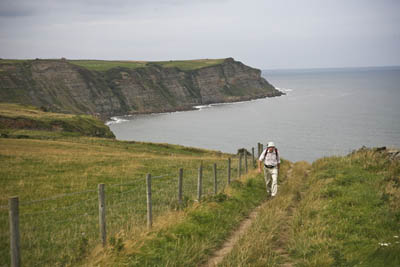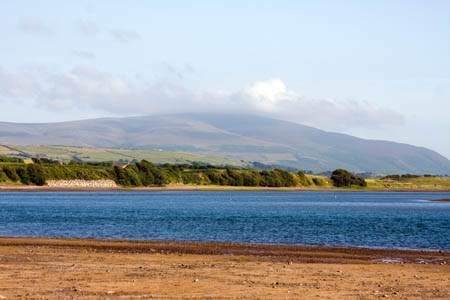
Natural England says the coastal path scheme has not been shelved, but the spending review looms
The Government body responsible for setting up coastal access around England has denied the project has been shelved as a result of coalition cuts.
This follows two reports recently in newspapers saying the coastal path will not go ahead. The path was the last big right-to-roam project of the outgoing Labour government under the Marine and Coastal Access Act.
The Sunday Times at the weekend quoted Tom Lewis, a manager at Natural England, who said the cost of the national scheme was ‘no longer acceptable in the current economic climate’.
Mr Lewis told the newspaper: “We are now being realistic and flexible and looking at what we will be able to deliver in terms of coastal access in certain areas.
“I can safely say we will not see an All England Coast Path in the next 10 years as was planned,” he added.
The Telegraph also ran a story saying the £50m scheme had been delayed indefinitely in favour of cheaper, localised improvements.
But today, Natural England, which is responsible for implementing the coastal path, said: “It is incorrect to say that the coastal access project has been shelved.”
A spokesperson at the organisation said: “Work in Weymouth has started, I believe, and is going ahead. We are going on as normal until we know what will happen after the comprehensive spending review in the autumn.”
However, there is still uncertainty over what will happen beyond the establishment of the initial section near Weymouth, which is due to be ready to coincide with the 2012 Olympic sailing events.

The Cumbrian coast is among five pilot schemes
Natural England’s spokesperson said: “As a result of a five per cent reduction to this year’s budget Natural England has needed to assess the scope and delivery of some of its in-year programmes. Five local authorities – Cumbria, East Riding of Yorkshire, Somerset, Kent and Norfolk – are involved in the implementation of the first phases of the roll out of the All England Coastal Path.
“Work at the Weymouth stretch of the coast path is continuing but the five local authorities have been informed that the scale and scope of the initial roll out in their areas will need to be reduced to accommodate the reductions in this year’s budget.
“Natural England is continuing with the roll-out in the five pilot areas and will await clarification from the [comprehensive spending review] process about the long-term budget that is likely to be available for funding roll-out in these areas and elsewhere.”
When asked about Mr Lewis’s view that the planned coastal path would not happen within 10 years, the NE spokesperson told grough: “Tom Lewis is on leave at the moment, so we haven’t been able to check how accurately he was quoted. What he said has possibly been misquoted.”
The two weekend newspaper reports followed a Financial Times blog which quoted an unnamed former Labour Department for the Environment, Food and Rural Affairs minister as saying the new coastal path would be the easiest cut to make in his old department.
The Ramblers were more upbeat about the future of the project.
Their director of campaigns Keith Roberts said: “I am delighted to pass on to everyone who has campaigned for, and will benefit from, coastal access legislation, the Under Secretary’s stated commitment to the coastal path.
“In addition, Natural England has confirmed that they are continuing to roll out on-the-ground schemes in five areas to pilot implementation of the coastal path. They will wait until the comprehensive spending review in October, then assess the scale and scope of the scheme.”
Mr Roberts said the minister in question, Richard Benyon, was on the record as saying ministers were committed to implementing the coastal access provisions in the Marine and Coastal Access Act, including the coastal path.
He said ministers have not stopped the roll out of the English coastal access path indefinitely but would look at the implementation according to the resources available and would have their own views on where the priority areas will be to boost coastal economies through tourism. He added that, contrary to some reports, they wouldn’t be putting the path through people’s gardens.
Mr Roberts added: “Our members, volunteers and members of the general public worked with us to ensure that coastal access was included in the Marine and Coastal Access Act. It’s really important that in the next few months we let the Government and other players know how much our ‘Big Society’ wants to enjoy and benefit from the delivery of the coastal path.”

Kate Ashbrook: £128m boost
Ramblers trustee Kate Ashbrook, who is also the general secretary of the Open Spaces Society, said the costs of the scheme would be outweighed by its benefits, saying: “During these times of austerity, it is more important than ever that Government maintains its commitment to funding and creating an all-England coast path which will boost seaside businesses by £128m per year.
“Coastal access involves volunteers and the wider community working together to create a grassroots scheme that, our survey shows, 94 per cent of people want. It should be at the heart of the Government’s ‘Big Society’ vision.”
But the uncertainty over the path’s future drew criticism from the landowners’ organisation the Country Land & Business Association. The CLA said that the legislation to create a coastal path and adjacent spreading room was ‘unnecessary’ – but stressed that the reported partial shelving of the plan is not a satisfactory solution, causing uncertainty and long-term blight.
CLA president William Worsley said: “Natural England has now accepted it cannot afford to impose the scheme within the 10-year time frame originally intended. As a result, every coastal homeowner, farmer and rural business in England will have their land blighted.
“No one can make long-term plans on what to do with their land when the right of public access is looming. It makes business planning impossible. This is completely unacceptable particularly at a time when all businesses should be free to prosper.
He said the coastal-access law was not necessary, and the prospect of spreading room around the coastal path was of particular concern for landowners.
Mr Worsley continued: “According to Natural England’s own figures, 84 per cent of the coast is already accessible to the public. Of the remaining 16 per cent, eight per cent will remain inaccessible because it is covered by ports, military bases and so on.
“Areas such as the South-West of England already have an excellent coastal path, so spending £50m of public money on a scheme to provide access to a mere eight percent of the coast in this time of austerity is clearly unjustified. The CLA believes access can best be provided on a local and voluntary basis.”
The cloud hanging over the future of the coastal path would seem to confirm the fears of then Liberal Democrat environment spokesman Lord Greaves, a keen walker, who said in the build-up to the May general election: “While we were passing the bill through Parliament the Conservatives sometimes seemed both partial and lukewarm in their support for this part of it.
“In addition, a Government looking for billions of pounds of cuts may find this important scheme to be an easy option. A battle has been won but I suspect the campaign for access to our coast is not yet over.”
His party is now a partner in the coalition Government that is looking for up to 40 per cent cuts in a bid to reduce the country’s fiscal debt. Calls to Lord Greaves had not been returned by the time we published.
The public already has rights of responsible access to Scotland’s coast under its Land Reform (Scotland) Act and the Wales coastal path comes under the jurisdiction of the Welsh Assembly Government.
David Cotton
11 August 2010A few comments about this: firstly, the £50 million would not be spent all at one time; perhaps the project can be put on the back-burner for a couple of years, with minimal spending. Negotiations with landowners could be going on in the meantime.
Secondly, the Labour Government hardly acted speedily in implementing the act. There are many sections of coast that deserve far better access - one of my favourites would be from Watchet to East Quantoxhead in Somerset, which would connect the SWCP with the paths leading east to Highbridge. Another would be the spectacular stretch of coast south from Berwick towards Bamburgh. There is no coastal access in these areas.
Instead, the first section is planned to be the 'Olympic Way' in Weymouth, which is scheduled to open in time for the Olympics in 2012 (see http://www.naturalengland.org.uk/regions/south_west/press_releases/2010/260310.aspx). The stretch will run from Portland to Lulworth, which already has a very good coastal path. So instead of picking a useful section that would allow brand new access to the coast, they decide to upgrade an existing path. It was truly a terrible decision.
Thirdly, be careful about the costings. Remember Right-to-roam? It was scheduled to cost only £28 million, but the eventual costs came out at £69 million. The NAO criticised the organisations responsible - see http://news.bbc.co.uk/1/hi/uk/5062460.stm. It looks as though one of the NAO's main complaints - the lack of a pilot scheme - has been ignored in the coastal scheme. Whilst there is an obvious conflict between pilot schemes and speedy work, I do not trust the current £50 costing.
Compare this with the Welsh Government's speedy work with their path.
As someone who has walked the coast, I am guardedly in favour of the new legislation. Right-to-roam has been a success from walkers' points of view. However, I am concerned about both the cost and implementation of the scheme.
David Cotton
www.britishwalks.org/